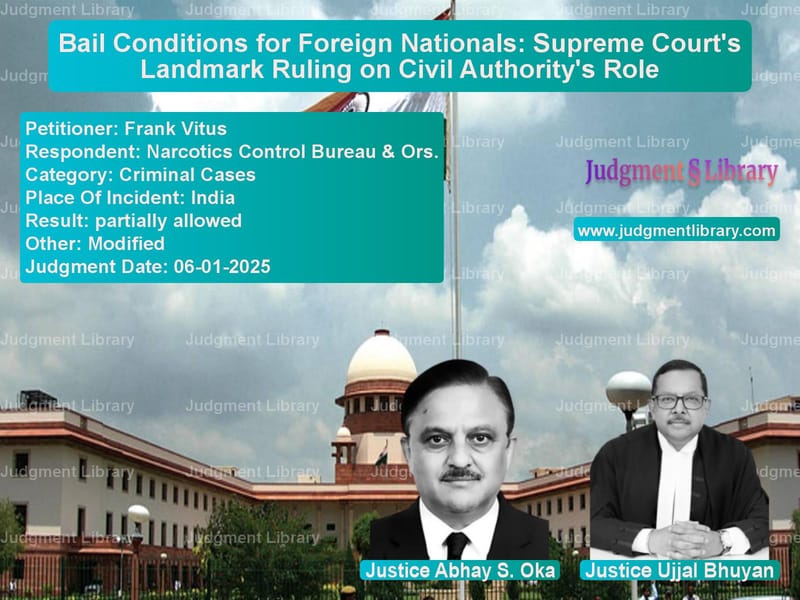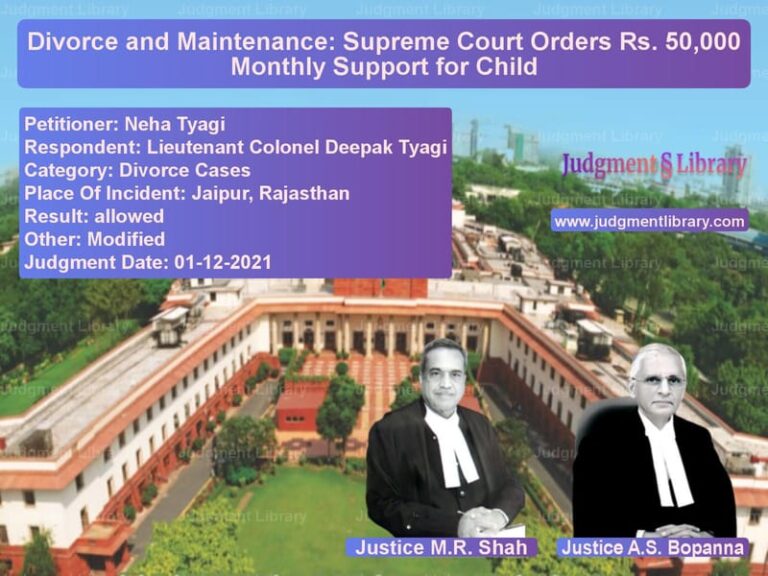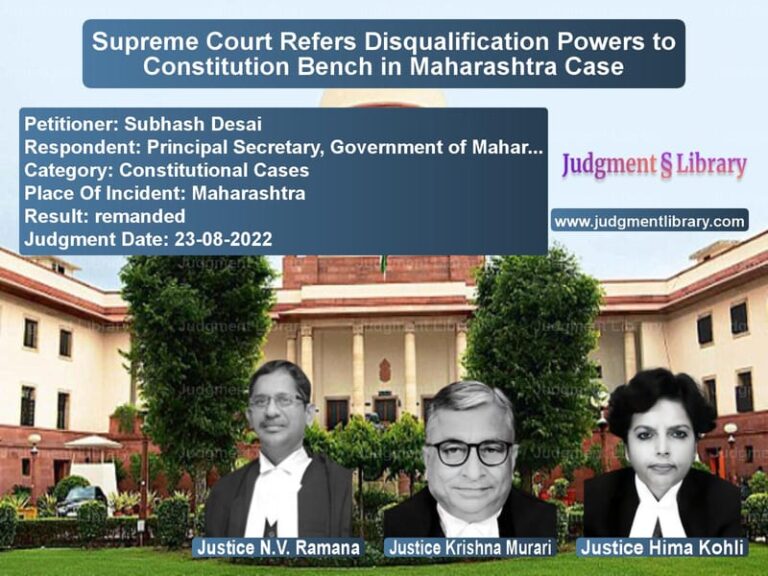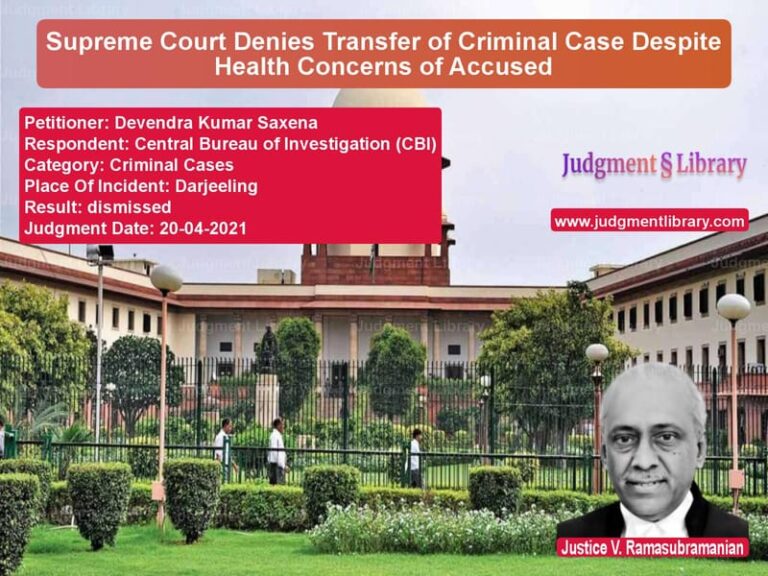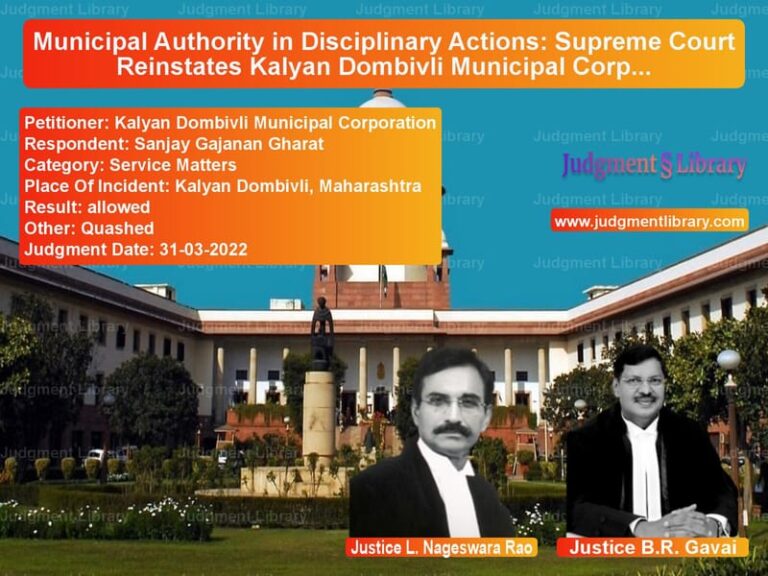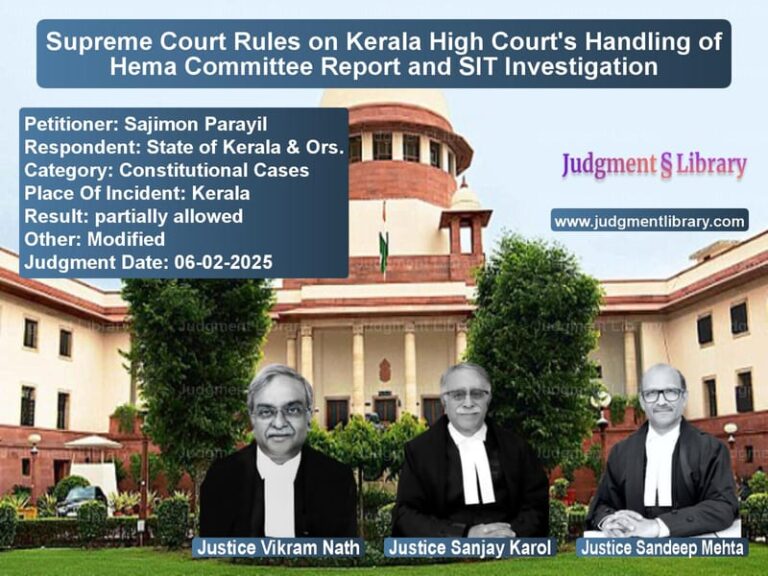Bail Conditions for Foreign Nationals: Supreme Court’s Landmark Ruling on Civil Authority’s Role
The recent judgment in Frank Vitus vs. Narcotics Control Bureau & Ors. has provided critical clarity on the legal process for granting bail to foreign nationals accused of crimes in India. The Supreme Court examined whether a Foreign Registration Officer or Civil Authority must be impleaded in bail applications filed by foreign nationals under the Foreigners Act, 1946, and the Foreigners Order, 1948. The ruling impacts how foreign nationals under trial will be monitored and whether additional conditions should be imposed on them.
Background of the Case
Frank Vitus, a foreign national, was accused under the Narcotic Drugs and Psychotropic Substances (NDPS) Act. After being granted bail, a legal dispute arose over whether Civil Authorities must be involved in bail proceedings for foreign nationals. The prosecution, led by the Narcotics Control Bureau (NCB), argued that due to his foreign status, additional oversight by Civil Authorities was necessary to prevent absconding. The defense countered that such a requirement was not mandated by law and would cause unnecessary delays.
Key Legal Issues
- Whether a Foreign Registration Officer should be a party in bail applications of foreign nationals.
- Whether foreign nationals require additional bail conditions beyond what is applied to Indian citizens.
- The role of Civil Authorities in monitoring foreign nationals under trial.
Prosecution’s Arguments
- The Foreigners Act, 1946, grants the Central Government the power to regulate the entry, exit, and presence of foreigners.
- Under Clause 5 of the Foreigners Order, 1948, a foreigner cannot leave India without Civil Authority permission.
- Given the risk of absconding, Civil Authorities must be notified of any bail granted to foreign nationals.
- Foreign Registration Officers play a key role in monitoring foreigners under trial and must be included in bail proceedings.
- Adding such conditions would prevent misuse of bail provisions by foreign nationals attempting to evade prosecution.
Defense’s Arguments
- There is no legal requirement under the Foreigners Act or the Foreigners Order for Civil Authorities to be included in bail applications.
- Section 143 of the Railways Act does not apply to bail conditions for foreigners.
- Requiring additional steps for foreigners would create procedural delays and violate the principle of equal treatment under the law.
- The judiciary should remain independent in granting bail without interference from administrative authorities.
Supreme Court’s Observations
The Supreme Court examined the relevant provisions of the Foreigners Act, 1946, and the Foreigners Order, 1948, and made several key findings.
1. Foreign Nationals Cannot Leave India Without Permission
The Court reaffirmed that under Clause 5 of the Foreigners Order, 1948, no foreigner can leave India without Civil Authority permission, particularly when facing criminal charges.
2. Civil Authorities Do Not Need to Be Impleaded in Bail Applications
The Court rejected the argument that Civil Authorities must be named as respondents in all bail applications of foreign nationals. The Court observed:
“We do not see any propriety in issuing a direction that either the Civil Authority or the Registration Officer should be made a party to a bail application filed by a foreigner.”
3. Prosecution Must Inform Civil Authorities of Bail Grant
While rejecting mandatory impleadment, the Court ruled that the investigating agency must notify the concerned Foreign Registration Officer when bail is granted to a foreigner, allowing Civil Authorities to take necessary measures.
4. Central Government’s Power to Restrict Movement Remains Intact
The Court clarified that even if a foreigner is granted bail, the Central Government retains the power to impose travel restrictions, arrest, or detain them under Clause 3(2)(g) of the Foreigners Act.
Conclusion
The Supreme Court ruled that while foreign nationals cannot leave India without permission, there is no legal requirement for Civil Authorities to be impleaded in bail proceedings. However, law enforcement must notify Civil Authorities once bail is granted to ensure proper monitoring of the individual’s movement.
Final Directives from the Supreme Court
- While granting bail to a foreigner, courts must direct the prosecution to immediately notify the Foreign Registration Officer.
- The Foreign Registration Officer will communicate this information to all relevant Civil Authorities.
- The Central Government may still exercise its authority to restrict the foreigner’s movement under the Foreigners Act.
- High Courts must ensure all lower courts follow these directives in cases involving foreign nationals.
The ruling is expected to have a significant impact on how courts handle bail applications for foreign nationals, ensuring proper oversight without unnecessary legal hurdles.
Petitioner Name: Frank Vitus.Respondent Name: Narcotics Control Bureau & Ors..Judgment By: Justice Abhay S. Oka, Justice Ujjal Bhuyan.Place Of Incident: India.Judgment Date: 06-01-2025.
Don’t miss out on the full details! Download the complete judgment in PDF format below and gain valuable insights instantly!
Download Judgment: frank-vitus-vs-narcotics-control-bu-supreme-court-of-india-judgment-dated-06-01-2025.pdf
Directly Download Judgment: Directly download this Judgment
See all petitions in Bail and Anticipatory Bail
See all petitions in Custodial Deaths and Police Misconduct
See all petitions in Judgment by Abhay S. Oka
See all petitions in Judgment by Ujjal Bhuyan
See all petitions in partially allowed
See all petitions in Modified
See all petitions in supreme court of India judgments January 2025
See all petitions in 2025 judgments
See all posts in Criminal Cases Category
See all allowed petitions in Criminal Cases Category
See all Dismissed petitions in Criminal Cases Category
See all partially allowed petitions in Criminal Cases Category

